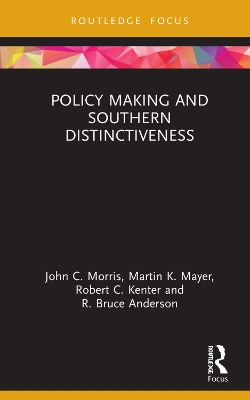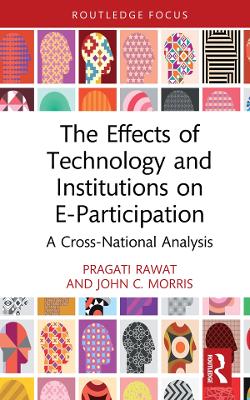Routledge Research in Public Administration and Public Policy
2 total works
Policy Making and Southern Distinctiveness
by John C Morris, Martin K. Mayer, Robert C. Kenter, and R. Bruce Anderson
Policy Making and Southern Distinctiveness examines the uniqueness of southern politics and their policy choices.
While decades of scholarship on the politics of the American South have focused on partisanship and electoral outcomes as the primary elements of interest in southern politics, few works have focused on the more practical outcomes of these political processes, specifically, comparing state policy choices of southern states to non-southern states. This book examines six different policy arenas: voting access, gun control, health care, reproductive rights, water, and COVID-19 pandemic response, comparing policy choices in states in the South with states in the non-South. The authors find that the South is distinct in several, but not all, of the policy arenas examined. They conclude that the South as a region is unique because of the exceptional degree of one-party control evident in the South, coupled with a long-standing preoccupation with partisanship and race-based politics.
Policy Making and Southern Distinctiveness provides valuable insights into how and why states behave in the manner they do and where southern states may diverge from the rest of the country. It will be of interest to scholars of southern politics, state comparative policy, public policy, American politics, and federalism/intergovernmental relations.
The Effects of Technology and Institutions on E-Participation
by Pragati Rawat and John C Morris
In this book Pragati Rawat and John C. Morris identify and evaluate the impact of factors that can help explain the difference in e-participation, public participation using information and communication technology, in different countries.
While cross-sectional studies have been covered, few have taken an in-depth look at cross-national studies. This book attempts to fill the gap using quantitative panel data to explore the influence of technology and institutions, and the impact of their complex relationships in a mediation and moderation analysis, on e-participation. The current study reviews the scholarly work in the field of “offline” and “online participation” to identify a set of antecedents that influence e-participation. A conceptual framework is developed, supported by the theories from the public policy and socio-technical premise. The authors utilize secondary data, primarily from the UN and World Economic Forum, for 143 countries from three waves of surveys to measure the dependent and explanatory variables. The panel data is statistically analyzed and findings reveal the role of technology as a mediator as well as a moderator for institutions’ impact on e-participation.
The Effects of Technology and Institutions on E-Participation provides a groundbreaking country-level analysis that will appeal to academics and students of e-government and Digital Government, Public Policy, Public Administration, Public Sector Innovation, and Public Participation.

